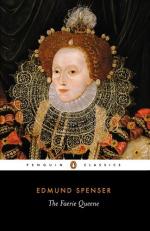238. OR OUGHT HAVE DONE, or have done something to displease you.
239. THAT SHOULD AS DEATH, etc., that should settle like death, etc.
248. AND CHOSE IN FAERY COURT. See Spenser’s letter to Sir W. Raleigh, p. 6.
250. HER KINDLY SKILL, her natural power.
276. FIERCE ORIONS HOUND, Sirius, the Dog-star, the brightest of the fixed stars. The constellation Orion was named from a giant hunter who was beloved by Aurora and slain by Diana.
279. AND NEREUS CROWNES WITH CUPS, and Nereus drinks bumpers in his honor. Nereus was a sea-god, son of Ocean and Earth.
282. FROM GROUND, from the land.
297. SANS LOY symbolizes the pagan lawlessness in Ireland. There is also a wider reference to the struggles between the Turks and the allied Christian powers, which had been going on since the siege of Vienna in 1529.
309. VAINLY CROSSED SHIELD, Archimago’s false cross lacked the protecting power of St. George’s charmed true cross.
321. LETHE LAKE, a lake or river of Hades, whose water brought oblivion or forgetfulness to all who drank of it.
322. Refers to the ancient custom of sacrificing an enemy on the funeral altar to appease the shade of the dead.
323. THE BLACKE INFERNALL FURIES, the Erinyes, or goddesses of vengeance, who dwelt in Erebus. They were robed in black, bloody garments befitting their gloomy character.
325. In romance it was customary for the victor to unlace the helmet of the knight whom he had unhorsed before slaying him. Friends and relatives were sometimes discovered by this precaution.
342. NE EVER WONT IN FIELD, etc., was never accustomed to fight in the battle-field or in the lists of the tournament.
xliii. Contrast Sansloy’s rude treatment of Una with the chivalrous respect and courtesy always shown by a true knight to woman.
QUESTIONS AND TOPICS
(Canto III)
1. What moral reflections does the poet make in the introductory stanza? Note the reference to the Queen. 2. What do you learn of the laws, customs, and sentiments of chivalry in this canto? 3. Give an account of Una’s meeting with the Lion. 4. Explain the allegory of the incident of the Lion. 5. Describe the character, appearance, and actions of Corceca, and explain the allegory. 6. Note the use of the stars to indicate time. 7. Under what circumstances does Una meet Archimago? 8. Explain the allegory in ix. 9. Note the Euphuistic balance in xxvii. 10. What figure do you find in xxxi? Note the Homeric style. 11. Describe the fight between Archimago and Sansloy, and explain the double allegory. 12. What is the moral interpretation of xli-xlii?
13. Explain the Latinisms in ll. 37 and 377. 14. How are the adjectives used in l. 57? 15. Note change of pronouns in vii from third person to first. 16. Explain tense of shold pas in l. 83. 17. Note confusion of pronouns in xxii and xxxv. 18. Examine the nominative absolute construction in st. xiv and xxxix. 19. Explain the ambiguous construction in l. 165. 20. Parse her in l. 262. 21. Note careless use of relative in l. 288.




